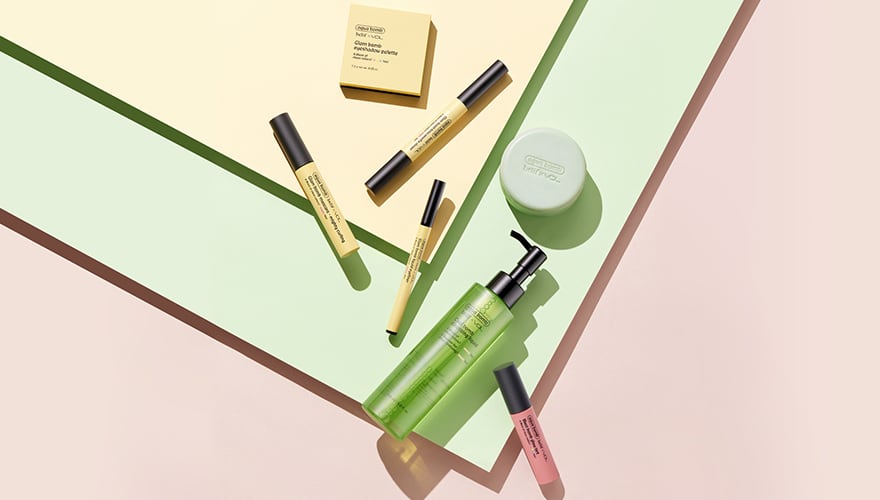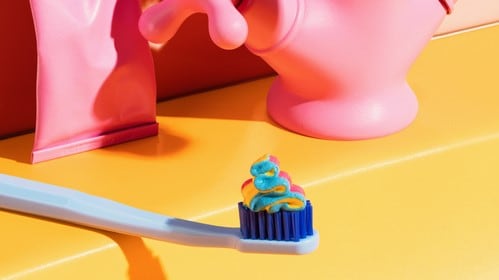Going back to science
From buzzword to beauty bedrock, the prevalence of clean beauty has continued to grow alongside the increased awareness of health and wellness.
But the clean beauty engine could be losing its steam, especially with outspoken industry figures like Caroline Hirons and brands like DECIEM making it their mission to dispel misinformation in beauty.
“Within the skin care space, you will notice the increasing emergence of skin care scientists, dermatologists, and cosmetic chemists on social media platforms like TikTok, YouTube, and Instagram. These experts are using these platforms to provide educational content to help school their audience on the truth of ‘clean’ beauty and bust common ‘clean’ beauty myths,” said Joanne Ang, founder of Singapore-based skin care brand Kansoskin.
“I believe we are at the point where you will be hard-pressed to find major beauty influencers who are still peddling clean beauty,” agreed Nico Yosman, co-founder of Singapore-based skin care brand 5 to 5 Skincare.
Ang highlighted the increase in cases of ‘preservative-free’ cosmetic products being recalled due to contamination and the “worrying upward trend of infections” caused by poorly preserved products, which have caused consumers to question the implication of clean beauty.
Furthermore, the growing focus on sustainability has been shining a light on the natural ingredients used by some clean beauty brands.
“Many are slowly recognising the fact that ‘natural chemicals’ that are well-loved by clean beauty brands are not always the most sustainable. Some of the most sustainable options are in fact lab-made, synthetic chemicals that are just as safe,” said Ang.
She told CosmeticsDesign-Asia that she was expecting the so-called ‘anti-clean’ movement to accelerate moving forward.
“With the rise of digital skin care aficionados voicing their opinions and discussing these topics with their group of followers via forums and social media, increased consumer awareness will further fuel the movement.”
Hopefully, she said, this would encourage more skin care brands to shed their reliance on typical clean beauty messages.
“With declining trust among consumers, I believe brands are slowly realising that it is no longer enough to create marketing messages based on unsubstantiated claims — these claims need to be backed by science in order to win consumers over.”
Yosman recalled a clean beauty brand used the term ‘no-nasties’ on Instagram and faced a huge backlash.
“It was nothing unusual for a clean beauty brand, but when you parsed through the comments, the amount of pushback from their followers was enormous.”
He also highlighted RFLCT, the skin care brand by gaming influencer Valkyrae, which tanked in a matter of weeks following the brand’s controversial claims of protecting against skin damage from blue light.
Moving forward, Ang hoped this would lead to a more transparent and regulated beauty industry with tighter definitions of the term ‘clean’ in beauty.
“At the end of the day, I think it won’t be about clean versus anti-clean or natural versus synthetic. Consumers just want to have effective skincare solutions that can solve their skin concerns, without jeopardising their skin, health, or the environment.”
Minimalism with hybrid beauty
The COVID-19 pandemic has fundamentally changed the way we live, work and play. In the last couple of years, we have experienced the acceleration of a more ‘hybrid’ style of living.
The boundaries that previously separated home, work, fitness and self-care have dissolved, and products are transforming to address this major shift.
In beauty, we have seen brands develop make-up products imbued with skin care ingredients to care for skin.
“Since the pandemic, people are definitely spending more time on their skin care rituals than before. People are embracing slow beauty and are letting their natural skin texture shine. They are always on the lookout for products that act as skin care and make-up to achieve flawless-looking skin while helping it heal too,” said Harini Sivakumar, founder and CEO of Earth Rhythm.
She added that trends such as skin minimalism have further driven the demand for hybrid products as shrinking budgets and a focus on essentials were encouraging consumers to simplify their beauty routines
Furthermore, she said the influence of sustainability and awareness of beauty waste has played a big role in accelerating this demand.
“Make-up and skin care products combined in one single product not only save money and time but also go easy on the resources. Instead of investing in five different products, we can have one benefit of all in one, which reduces packaging waste too.”
In addition to all this, hybrid beauty products were tapping into the innate consumer desire for practical and convenient products.
“When it comes to beauty, usability is key. Consumers are increasingly drawn towards products that are effortless and quick to apply, products that can potentially multi-function, and products that reduce the need for an elaborate routine.”
With innovations in areas such as biotechnology and sustainable beauty, Sivakumar said she would expect to see more sophisticated versions of hybrid beauty products moving forward.
“With innovative technologies and multiple benefits, it clear that hybrid beauty isn’t just a fleeting trend but most likely has the potential to become the future of the beauty industry.”
Delivery on-demand
While cities are emerging from lockdown and consumers are heading back to the shops, online shopping shows little sign of declining.
In fact, global players such as Shiseido, Kao Corporation, L’Oréal Group and the Estée Lauder Companies have reported strong online sales so far and have committed to investing more into this lucrative channel.
With the acceleration of e-commerce in the past couple of years, consumers have become more discerning about their online shopping experiences. Among the top of the list for consumers are on-demand deliveries.
“In the past, one- to two-day delivery was considered fast. In some remote locations, deliveries could take even longer… Very soon, customers will no longer settle for a long delivery lead time,” said Freda Ng, chief digital officer, Watsons International.
On-demand deliveries combine the convenience of online shopping with the immediacy of brick-and-mortar retail.
At the forefront of on-demand deliveries is China, where companies like Watsons, Sephora, and Amorepacific have begun speeding up their delivery services.
In August this year, Sephora China collaborated with local on-demand delivery and retail platform Dada Group to bring beauty consumers convenient one-hour shopping services.
The LVMH-owned retailer launched this service in over 70 Sephora stores in China and had plans to roll it out across every single store in China by the end of 2021.
Speaking to CosmeticsDesign-Asia, Sephora China said offering same-day deliveries “delights” its consumers.
With on-demand deliveries, the beauty retailer has been able to meet new consumer demands.
For instance, the company has observed that its consumers were using on-demand delivery services to urgently replenish their beauty products or buy products they have forgotten to pack for travel.
Additionally, increasingly busy urbanites have used the service to conveniently send gifts to friends and loved ones.
Watsons’ consumer research has shown that the demand for same-day deliveries is not limited to China.
After offering on-demand deliveries in China for more than three years, Watsons inked a deal with Grab, a Singapore-headquartered tech company with ride-hailing, food delivery, package delivery and payment solutions.
The partnership allowed it to extend its on-demand delivery services to South East Asia, reaching Singapore, Malaysia, Indonesia, Thailand, Vietnam, and the Philippines.
“To offer a seamless O+O shopping experience, Watsons’ express delivery services now enable customers to have their products delivered in under two hours. This will set a new standard for fast and reliable delivery in SEA,” said Ng.
Water-conscious beauty
The push for more earth-friendly beauty and personal care products have pushed cosmetic companies to offer their consumers a plastic-free or waste-free beauty routine.
In the past year, we’ve seen company launch refill programmes, developed refillable jars, and adopt recyclable materials like aluminium or mono-plastics.
However, there is another element to the plastic-free puzzle that is slowly and surely catching on.
“Water and the use of plastic go hand-in-hand,” said Lynn Tan, founder and CEO of waterless and plastic-free hair care brand, The Powder Shampoo.
“If the formula is waterless, there is higher chance it does not require plastic packaging which is a big win for the environment.”
According to the United Nations, nearly half the global population are already living in potential water scarce areas at least one month per year and about 73% of those affected live in Asia.
Water is a fundamental ingredient in cosmetics, with some formulations consisting up to 90% or more of aqua. With products like soaps and shampoos, more water is used to activate the product.
“When we shampoo, we also use clean water to lather up. If you think about it objectively, liquid shampoo does not make any sense. The weight during transporting gallons of liquid shampoo around the world means higher carbon emissions,” said Tan.
While reducing the use of water in personal care formulations could have a tremendous positive effect on the planet, it will take more education effort to convince consumers to adopt them.
“The main challenges are production and mentality. The current beauty industry has been built around water usage. It would take investments to reshuffle the production lines and more money to scrap the existing equipment. Large companies would naturally avoid the kind of investment for as long as it could,” said David Zhang of water-conscious personal care brand Bhuman.
“From consumer point of view, water-based products have always been part of their daily routine. The concern seems to be around whether the waterless products are as high performance as the products consumers are used to. In addition, consumers tend to think sustainable products cannot be luxurious and glamourous. We are trying to change these perceptions and it will take some time.”
With more independent brands developing water-conscious products to meet the growing demand of the educated and conscious crowd, both Tan and Zhang were hopeful that waterless beauty will become the norm eventually.
“While it might take some time before full adoption, we sense consumers are becoming more aware of the needs for sustainable living. We are also more encouraged by the retention ratio of the consumers who tried the waterless products. There is no question in our mind that waterless beauty is the way to go,” said Zhang.
Asian fragrances going global
It is no secret that the future of luxury fragrances is in Asia. While Asian consumers used to buy perfumes for their brands and status, over the years, their tastes and preferences have grown increasingly sophisticated.
At the same time, Asian consumers, especially the younger millennials and gen Zs, are craving brands and products that represent their varied cultures and values. This has primed the market for the bloom of new independent Asian-led fragrance brands across the continent.
“I think there's so much incredible creative energy within this region. That’s the thing about development – it takes time for creative scenes to flourish. Asia is having a really strong moment in perfumery but also in fashion and design. I think it’s really strong and it’s only going to keep going,” said Phway Su Aye, co-founder of Gabar.
Gabar is a months-old luxury fragrance brand from Myanmar with ambitions that extend beyond its own backyard.
The brand opted to make its debut in the UK last year and has planned to continue its expansion in the West before returning to Asia.
“I think there's a lot of things that are supporting and spotlighting Asia at the moment. For example, within the US, there was a whole movement that really highlighted and supported Asian-American rights. And it really shifted the consciousness of Americans at least into thinking about Asian-led brands,” said Aye.
She added that this has translated to other western countries like the UK, where brands led by people of colour have traditionally not been as well represented.
“Now I think when people see a Thai perfume or an Indian perfume, they are very interested because they want new perspectives and they want to lift underrepresented groups, that's something that's definitely supporting Asian fragrances. I think in general, there's a whole feeling within beauty and beyond beauty for fresh voices and new representation.”
Aye added that the COVID-19 pandemic has also contributed to the interest in Asian fragrances in the western markets.
“This feeling has come out of COVID because of nostalgia and wanting to travel and be in other places. Asia, in general, is such an attractive as a place to travel but because we can't go there and we can't experience it, there's a kind of longing I think, for products that come out of these regions.”





